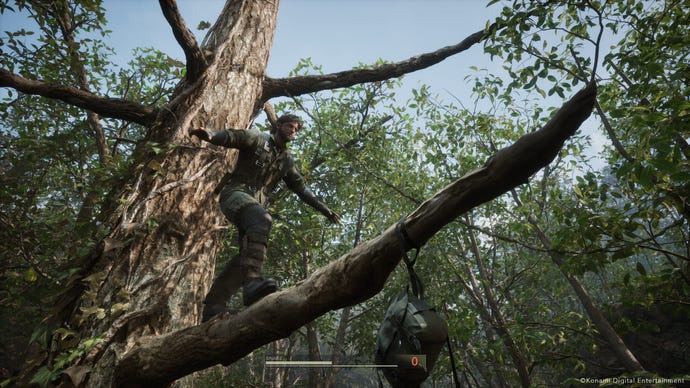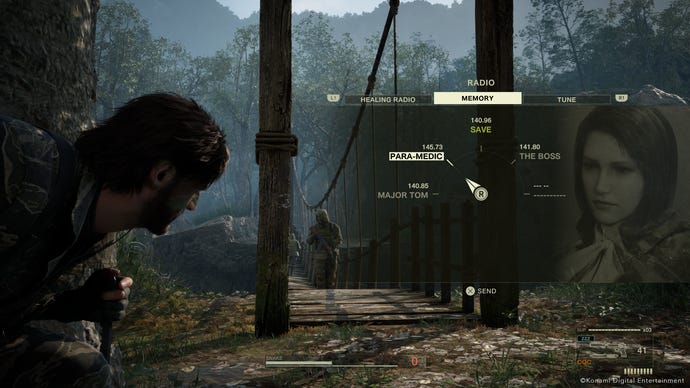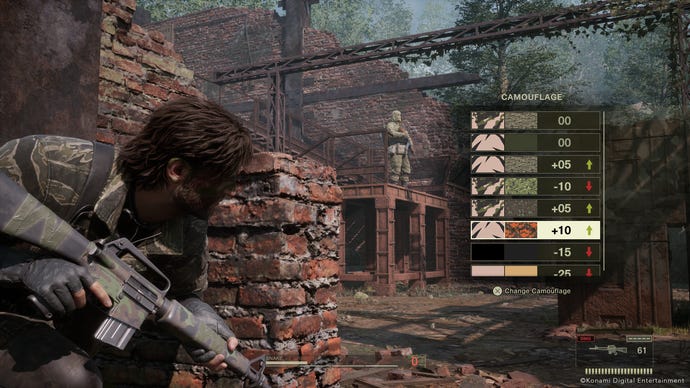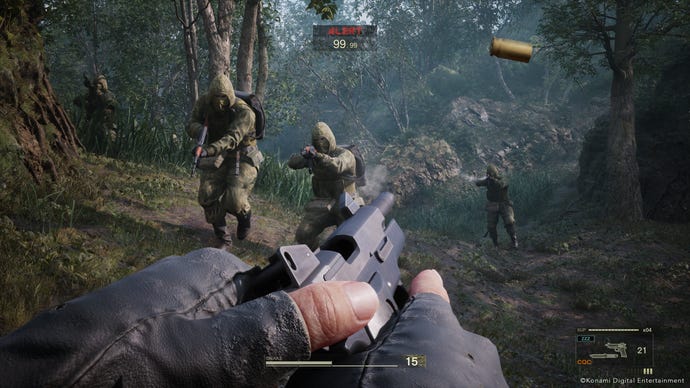Products You May Like
Almost a decade after his acrimonious departure from Konami, the shadow of Hideo Kojima still looms over Metal Gear Solid. He’s there, barely camouflaged, in the undergrowth of Metal Gear Solid Delta: Snake Eater – a remake of the fifth Metal Gear game, originally released in 2004, which tells the tale of a lone US special operator hunting superweapons and old mentors in the jungles of the southern Soviet Union.
I say “remake” but this feels more like a re-release, in spirit. True, it now runs on Unreal Engine, with the option of a manual, third-person perspective and cover-shooter controls in addition to the old top-down viewpoints. Yes, it boasts new flourishes, such as wounds now leaving scars, and clothes picking up stray leaves. Yes, there’s a new interface with floating in-world menus, which makes shuffling between the layers a bit less awkward. It’s the product of much labour, with development split between Konami and external support partner Virtuos. But where Konami’s other big restoration project, Bloober’s Silent Hill 2 remake, is a creative dialogue with the original game, Delta seems consumed by faithfulness to Kojima’s original design.
I’ve replayed the first hour of Metal Gear Solid 3: Snake Eater more than that of any other game, struggling to extract a perfect run from its dorky camouflage systems, which let you switch up clothes and facepaint instantly while lying right under an enemy’s nose. Playing an hour of Delta felt like just another crack at the prize: rescuing my bag from a tree branch, navigating that swampy area with the crocs, hiding from guards in a hollow log, scurrying across an exposed rope bridge to the factory with the Soviet rocket scientist. Konami might call that familiarity a success, but MGS3 has been rereleased twice before – there was the expanded Subsistence version in 2005, and the HD update in 2011, which is still available. I don’t, so far, feel the need for another tour in Naked Snake’s boots, though I guess I can’t blame Konami for being careful with Delta’s design. Their first attempt at a post-Kojima Metal Gear Solid, 2018’s zombie interlude Metal Gear Survive, was a bit of a stinker.




To steal one of Graham’s ideas when we discussed the game last week, the biggest ‘update’ in Delta is simply the awareness that Hideo Kojima is no longer working on the game. It alters my perception of Snake Eater’s quirks and foibles. These are no longer the gambits of an adventurous and obtuse creator-tyrant, but a design-by-committee recreation of that personal vision, with some “modern” bits delicately grafted on. The obvious rebuttal there is that the extent of Kojima’s control and oversight have always been a little illusory, because even at the time of Snake Eater’s creation, Metal Gear Solid games were vast productions. There’s some truth to the idea of Kojima the obsessive having his fingerprints on everything, but this is also a carefully cultivated aspect of Kojima’s brand. It’s what MGS nuts play MGS for, that impression of closeness to the master in every detail.
Can that intimacy outlive “the” creator, or has Kojima become (brace for deep-ish cut) something like the Colonel Campbell who oversees Raiden in Metal Gear Solid 2? And if that’s the case, who could finally oust the figure of Kojima and steer Konami through the creation of brand new, original Metal Gear Solid games? I asked producer Noriaki Okamura about this at the Delta hands-on event. The answer: there isn’t anyone currently, but we have a few people on our radar.
“So in terms of someone to sort of replace that creative director role, there isn’t really a single person that has taken over,” Okamura told me through a translator. “But rather, we’ve created this new Metal Gear Solid team – we’ve got a great team full of young new creative minds, a very talented team that are currently working on this game together.
“And within this team there are many people that we think in the future as well could definitely be people like that, who could create these new ideas, have these creative visions, and this is definitely a team that we would like to develop and grow into roles like that. But there isn’t a specific person that has taken over, necessarily, it’s much more of a team effort.”
Okamura himself seems like he might have the knowhow to cover it, having worked with Kojima on a bunch of Metal Gear Solid games and Zone Of The Enders, but as he went on to explain, the particular blend of designer chops and salesmanship embodied by Kojima is hard to replicate. “With his game design, he’s very particular about very detailed aspects of what he creates. He’s also very good at just creating a product and selling that product and knowing how to promote that product from start to finish. And to find someone like that, who is good at all of those things in the same capacity, is quite difficult. So it’s not like we can just go and find someone else that can do all of the same things, and it’s not something that I think I could do by myself.
“Obviously we have a lot of respect towards his creative vision,” Okamura added. “And in terms of our new team, we’d like to create these games in our own way with our own talented team that we have, with our own creative ideas for the current generation of fans, and the next generation of fans as well.”
Okamura’s answer also gave me the answer to my follow-up question: did Delta’s creators consider taking more liberties with MGS3’s fundamentals, perhaps meddling with the story? I brought this up partly in light of Square Enix’s qualified success with Final Fantasy 7’s remakes, which are effectively brand new works with drastically dissimilar combat, writing and framing that respond half-antagonistically to the original. But I also asked because Metal Gear Solid games in particular love to poke fun at their predecessors and the techno-thriller psycho-drama that is Metal Gear as a whole.
The original version of Snake Eater opens with a gag aimed at people who hated Raiden in MGS2, for example. Snake whips off his oxygen mask and lo and behold, it looks like there’s a new Raiden beneath, but then it turns out this is also a mask. This bit of japery is long gone in Delta – I can’t remember if it was removed by this or a previous Snake Eater re-release – which makes sense, given that we’re talking about a 20-year-old fan controversy. Even so, that’s the kind of meta humour and genial trolling I look for in a Metal Gear Solid. So far, Delta seems determined to play its own “remake” status straight.
Okamura doesn’t see things that way, of course. MGS3 is his “personal favourite” of the series, and he wants “both old fans and new fans to experience that same excitement and thrill that he experienced when first playing Metal Gear Solid 3”. For Konami, Okamura went on, “Delta is Metal Gear Solid 3, it’s not something new, it’s not a completely new title. It’s the game as it works for us.
“Obviously it is a 20 year old game now, so the graphics for example needed to be updated, and the controls needed to be updated, to adapt to the current generation of consoles, the current generation of gamers,” he said. “We want them to be able to enjoy the experience the same way as it was, but without thinking ‘I don’t know how to use these controls, I don’t understand what this is’. We want them to be able to experience the game without any struggle whatsoever.”
This caution adds up in the wake of Survive. But still – speaking as an outsider who is blissfully unencumbered by any practicalities, I’d love Konami to half-jokingly reposition Kojima as Metal Gear Solid’s unspoken spiritual nemesis, a forbidding legacy kept alive by comparison with Kojima’s projects after Konami. It would certainly be a plausible extension of the reportedly heated circumstances of Kojima’s exit, which saw him barred by Konami’s lawyers from collecting an award for Metal Gear Solid V: The Phantom Pain. Again, though, you need to find the right people to helm the series, or invent them. Turning Kojima into some kind of nebulous archvillain would require the construction and elevation of a new protagonist, a new Boss or Patriots-style inner council of prescient weirdos, with enough egotism and charisma to impose a story on a series that still lives in Kojima’s shade.
